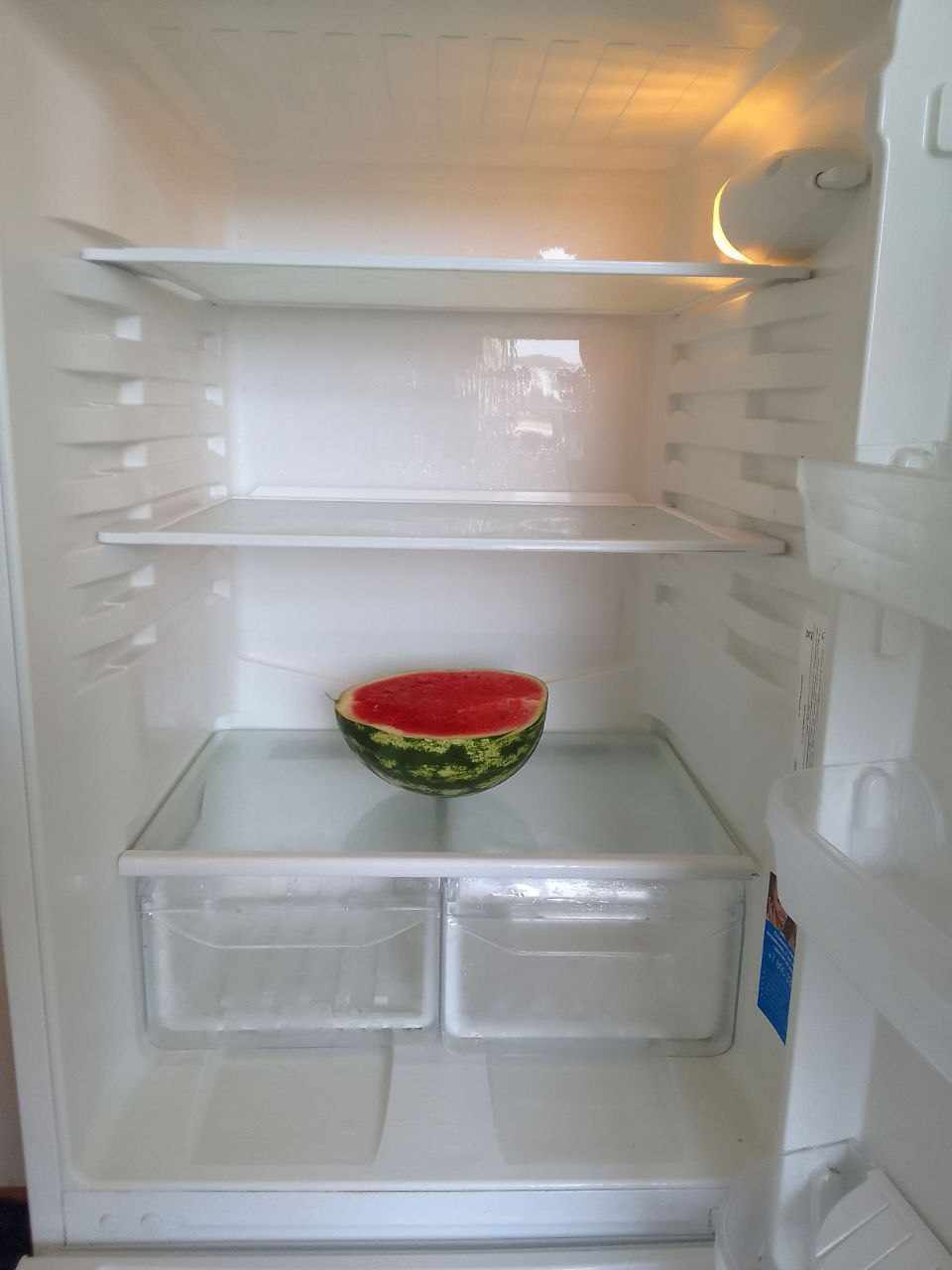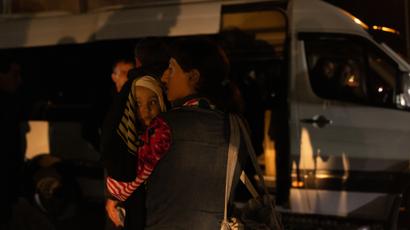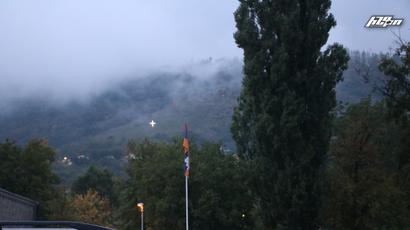!["As the queue reached me, the bread had already run out. I bought watermelon to eat instead of bread" [Blockade from the inside]](https://cdn.infocom.am/enlarge?file=2023-08-02-de18cd9a-2a7e-4502-8603-cff3d45231fe.jpg&type=jpeg&width=900&height=506)
"As the queue reached me, the bread had already run out. I bought watermelon to eat instead of bread" [Blockade from the inside]
Anna Manasyan in the photo
Anna Manasyan, a 21-year-old resident of Martuni, Artsakh, has been unable to return home for three weeks. Currently, there is no public transport available in Artsakh, due to the lack of fuel, she has been stranded in Stepanakert. However, at least she has a job and, for now, a place to stay in Stepanakert. "It's really bad," Anna says, and a moment of silence follows on both sides of the phone.
Today, Anna waited in line for an hour to buy bread but, unfortunately, was left with nothing in the end.
"It's hard to put into words, the situation in the city is terrible, really bad, there's nothing left. Today, I stood in line for an hour, and when my turn finally came, the bread had already run out. They hand out numbers up to 200 written on papers. You wait for so long and the queue can reach number 100 and the bread might already be sold out by then. Now, they even give people dough for the bread they couldn't manage to bake so that at least people can bake at home," says Anna, who was told to go for bread again at 3 p.m., but she finds it extremely challenging to walk as the bakery is located far away from her current location. "There was no bread, so I bought a watermelon to eat instead of bread. At least it's sweet," says Anna without any additional tragedy in her tone.

If, by any chance, they come across a car with fuel, Anna's mother sends some vegetables from Martuni, and they share everything they have with her roommates. Anna adss that at least people have gardens in villages, from which they manage to get a small harvest. Otherwise, there is almost nothing left in Stepanakert.
"In Martuni, at least everyone has their own garden, and if someone doesn't have something, others pass on their harvest to help. Maybe someone has flour, and they bake bread and share it with others. However, in Stepanakert, with its large population, there is nothing left. The city is lacking vegetables, and the situation is dire. If someone from the villages manages to find a "Pazik" car (a type of Soviet bus) and brings a box of tomatoes, it will be gone in half an hour; there are so many people, and it won't reach everyone," Anna explains.
Today, in the bread queue, Anna witnessed a particularly poignant episode. She shares that there were two women, one slightly older and the other younger, with children. Anna shares the emotional encounter, saying, "The woman was saying, 'If I can buy at least a loaf of bread, I'll take it home and divide it so that the children can at least have something to eat.' The other woman responds, 'How about you?' to which the first woman replies that she hasn't eaten bread for two days. 'I share bread, so that the children can eat twice,'" Anna adds, expressing how deeply upset she was witnessing this conversation.
One day, Anna and her friend were uncertain about what they could eat for that day, however, they found a pizza dough in one of the shops. "We placed the dough in the oven and warmed it up slightly, so we could eat it as if it were bread. There is no meat, there are no other products. Whatever is left, is very little, people are left with barely enough to sustain themselves for 10-15 days in their homes. Nowadays, many shops have already closed, and there is not even a café to take the children and eat something," Anna shares. She adds that as adults, they try to take it easier, but it's heart-wrenching that the children's desires cannot be fulfilled, and the parents are unable to find what the kids need.
The most essential medicines have already been depleted. Yesterday, Anna's friend finally found a car to go to the village. She had to take her grandmother's blood pressure medications with her, but unfortunately, they couldn't find it anywhere in the city despite searching extensively. "There are very few medicines left, and the daily medications that elderly people require are no longer available."
Since December 12, 2022, Azerbaijan has closed the only road connecting Artsakh to Armenia - the Lachin corridor. On April 23, 2023, the Azerbaijani side blocked the Hakari Bridge on the Artsakhi-Armenian border, an area under the responsibility of the Russian peacekeeping contingent in the Lachin corridor. This action further exacerbated the existing humanitarian crisis. An Azerbaijani checkpoint has been established on the Hakari bridge. Since June 15, Azerbaijan has imposed a complete ban on all humanitarian transportation along the Lachin corridor. After that, the ICRC was only able to transport patients from Artsakh to the Republic of Armenia on a few occasions.
On July 29, Azerbaijan abducted a 68-year-old citizen, who was being transferred to Armenia with the mediation of the ICRC for treatment, at a checkpoint near the Hakari bridge and transported him to an unknown location. On August 1, Azerbaijani servicemen abducted another citizen who was attempting to travel on foot from the Artsakh village of Hin Shen to Armenia. As of now, his whereabouts remain unknown.
Essential food and medicines are almost completely depleted in Artsakh. The coupons issued months ago for purchasing products have become worthless, given the emptiness of the stores. People go out only to buy bread. Artsakh has run out of fuel, resulting in the complete halt of public transport. Private cars rarely operate due to the scarcity of fuel. Gas supply experiences periodic interruptions, there are frequent power outages. A total of 120 thousand people, including 30 thousand children, are currently under a complete blockade in Artsakh.
Photos are provided by Anna Manasyan
Hayarpi Baghdasaryan


!["I don't want my children to starve, to be subjected to genocide, I want to live in Artsakh, to build our Homeland" [Blockade from the inside]](https://cdn.infocom.am/enlarge?file=2023-08-10-4865f192-ab13-4e84-beab-6232fbca7831.jpg&type=jpeg&width=410&height=230)
!["It's truly unbearable to be captive on your own land; everyone wants to live, yet the possibility of life is uncertain" [Blockade From The Inside]](https://cdn.infocom.am/enlarge?file=2023-08-07-4da13b91-9ae8-4497-a322-a6173bea598d.jpg&type=jpeg&width=410&height=230)
![A mother of five from Artsakh prepares sweets using the last remaining ingredients at home and shares them with neighboring children. [Blockade from the inside]](https://cdn.infocom.am/enlarge?file=2023-08-07-a38344bf-93f4-46f3-be0d-27ad2e27cf27.jpg&type=jpeg&width=410&height=230)
!["When we are in our own country, we endure whatever comes our way; the crucial thing is that we live here as Armenians, bread and hunger, though difficult, are not the primary focus." [Blockade from the Inside]](https://cdn.infocom.am/enlarge?file=2023-08-05-465609c7-c0fd-42d2-9db7-2a568a7428a5.jpg&type=jpeg&width=410&height=230)
!["I will sleep hungry, I won't even eat sweets, but in exchange, I expect to live in my motherland, Artsakh" [Blockade from the inside]](https://cdn.infocom.am/enlarge?file=2023-08-05-ab9a84b3-3f5e-4bcd-b049-5e8660312ed8.jpg&type=jpeg&width=410&height=230)
!["The fact of Artsakh not being part of Azerbaijan is of greater importance than concerns about food." [Blockade from the inside]](https://cdn.infocom.am/enlarge?file=2023-08-04-3e113b85-6b81-4589-b241-11323a00de2b.jpg&type=jpeg&width=410&height=230)
comment.count (0)